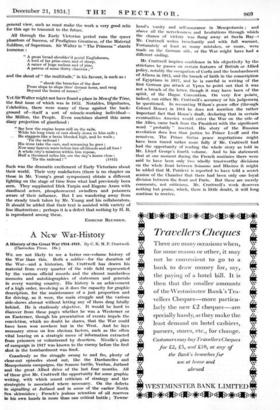A New War-History
A History of the Great War 1914-1918. By C. R. M. F. Cruttwell. (Clarendon Press. 18s.) WE are not lfliely to see a better one-volume history of the 'War than this. Both a soldier—for the duration of
the War—and a historian, Mr. Cruttwell has drawn his material- from - every quarter of the wide field represented by the various official records and the almost numberless memoirs and autobiographies of statesmen and generals in every warring country. His history is an achievement of a high order, involving as it does the capacity for graphic
description, for the maintenance of a just proportion and
for driving, as it were, the main struggle and the various side-shows abreast without letting any of them drag fatally behind. He is studiously objective. It would be hard to discover from these pages whether he was a Westerner or an Easterner, though his presentation of events impels the conviction, which no doubt he shares, that the War could have been won nowhere but in the West. And he lays necessary stress on less obvious factors, such as the often vital bearing on a strategiC move of information extracted from prisoners or volunteered by deserters. Nivelle's plan of campaign in 1917 was known to the enemy before the first shot in the bombardment was fired.
Ceaselessly as the struggle swung to and fro, plenty of clear-cut episodes stood out, like the Dardanelles and Mesopotamia campaigns, the Somme battle, Verdun, Jutland and the great Allied drive of the last four months. All of -these give Mr. Cruttwell the opportunity for some graphic writing, with which sound criticism of strategy and the strategists is associated where necessary. On the defects in signalling at Jutland and in some of the earlier North ;Sea skirmishes ; French's jealous retention of all reserves in his own hands in more than one critical battle.; Towns- hend's vanity and self-assurance in Mesopotamia ; and above all the nervelessness and hesitations through which the chance of victory was flung away at Suvla Bay-4 Mr. Cruttwell writes trenchantly and with full warrant. Fortunately at least as many mistakes, or more, were made on the German side, or the War might have had a different ending.
Mr. Cruttwell inspires confidence in his objectivity by the strictures he passes on certain features of British or Allied policy, notably the occupation of Corfu and the bombardment of Athens in 1915, and the breach of faith in -the conscription of Egyptians in 1917, and he is careful in writing of the first German gas attack at Ypres to point out that it VMS not a breach of the letter, though it may have been of the spirit, of the Hague Convention. On very few points, indeed, can either Mr. Cruttwell's. accuracy or his judgement be questioned. In recounting Wilson's peace offer (through Colonel House) in 1916 he does not mention the rather important fact that House's draft, declaring that in certain eventualities America would enter the War on the side of the Allies, came back from the President with the significant word " probably " inserted. His story of the Russian revolution does less than justice to Prince Lvoff and the zemstvos. The Prince Sixtus peace negotiations might have been traced rather more fully if Mr. Cruttwell had had the opportunity of reading the whole story as told in Mr. Lloyd George's fourth volume. And to his statement that at one moment during the French mutinies there were said to have been only two wholly trustworthy divisions on the whole front between Soissons and Rheims it might be added that M. Painleve is reported to have told a secret session of the Chamber that there had been only one loyal division between the front and Paris. But these are merely comments, not criticisms. Mr. Cruttwell's work deserves nothing but praise, which, there is little doubt, it will long continue to receive.


































 Previous page
Previous page